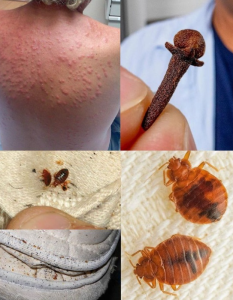Natural Pest Control: Eliminate Bed Bugs and Household Pests with Diatomaceous Earth & Cloves
In today’s world, where household pests such as bed bugs, ants, cockroaches, and fleas persist despite modern chemical treatments, many people are turning to nature for safer, sustainable solutions. Two such natural remedies that have gained significant attention are diatomaceous earth and cloves. Individually, these substances possess unique pest control properties, and when combined, they can create a powerful solution to combat infestation while keeping human and pet health in mind.
Understanding Diatomaceous Earth
Diatomaceous earth (DE) is a naturally occurring sedimentary rock composed of fossilized remains of diatoms—a type of hard-shelled algae. Its fine, abrasive powder is non-toxic to humans and pets but lethal to small pests. The science behind DE’s pest control lies in its physical properties. The microscopic, sharp edges of diatom particles pierce the exoskeletons of insects, causing them to dehydrate and eventually die from fluid loss. This method of action is purely mechanical and does not rely on chemicals or toxins.
Because of its gentle yet effective mechanism, diatomaceous earth is a versatile tool in the fight against pests. It can be scattered in areas where insects are likely to travel, such as along baseboards, under appliances, or near bedding. However, when using DE, it is important to use food-grade varieties only. Food-grade DE is safe for use around humans and animals, whereas industrial-grade versions may contain additives that could be hazardous if inhaled or ingested.
The Role of Cloves in Pest Control
Cloves, on the other hand, are not only valued as a spice but also prized for their natural pesticidal properties. Clove oil, which is derived from the flower buds of the clove tree, contains eugenol—a compound that has potent antimicrobial, antifungal, and insect-repellent properties. Eugenol disrupts the nervous systems of various insects, repelling them and, in some cases, killing them.
Historically, cloves have been used in traditional medicine and natural remedies due to their antiseptic and analgesic qualities. In pest control, clove oil is often diluted with water and used as a spray to create an inhospitable environment for pests. Its strong aroma disrupts the sensory receptors of insects, making it difficult for them to navigate and settle in treated areas. Moreover, cloves can help mask scents that might otherwise attract pests into your home.
Combining Diatomaceous Earth and Cloves for Enhanced Effectiveness
While diatomaceous earth works mechanically to kill pests and cloves repel them, combining these two methods offers a multi-faceted approach to pest management. Using both not only attacks pests on two fronts but also minimizes the need for chemical pesticides, which can be harmful over time. Here’s how you can combine them for an effective natural pest control regimen:
-
Preparation and Safety Measures:
Before application, ensure that all surfaces are clean and dry. Wear a dust mask when applying diatomaceous earth to avoid inhaling the fine particles. Ensure that clove oil is diluted appropriately before use, as its potency may irritate sensitive skin or mucous membranes if applied undiluted. Food-grade DE should be stored in a sealed container to prevent accidental spills. -
Application Strategy:
Start by sprinkling a thin layer of diatomaceous earth in areas known for pest activity such as along baseboards, under furniture, and in the corners of rooms. The fine powder should be spread evenly to create a continuous barrier that pests must cross.
Next, prepare a clove oil solution by mixing about 20–30 drops of clove oil in one cup of water. You can add a few drops of mild liquid soap to the mixture to help the oil adhere to surfaces. Using a spray bottle, apply the clove oil solution over the same areas where the diatomaceous earth has been spread, paying special attention to crevices and gaps where pests might hide. -
Monitoring and Reapplication:
It is essential to monitor the treated areas over the following days. Insects may not die immediately, as DE works gradually and clove oil repels rather than instantly kills. If pests continue to appear, reapply the clove oil solution every few days and ensure that the diatomaceous earth remains undisturbed. Heavy foot traffic or cleaning might reduce the effectiveness of the DE barrier, so periodic reapplication is advisable. -
Integration into a Broader Pest Management Plan:
While the combination of diatomaceous earth and cloves is effective, it should form part of a comprehensive pest management strategy. This can include measures such as vacuuming regularly to remove dead insects and debris, sealing entry points around the home, and maintaining proper sanitation. Reducing moisture and clutter also plays a critical role in deterring pests.
Addressing Bed Bugs Specifically
Bed bugs are particularly resilient pests that thrive in cluttered environments, especially in bedding and furniture. Their ability to hide in the smallest crevices makes them difficult to eradicate. However, the dual action of diatomaceous earth and cloves offers a promising solution:
-
Diatomaceous Earth Against Bed Bugs:
DE’s abrasive quality is especially effective against bed bugs, which have soft exoskeletons susceptible to dehydration. By applying DE around the edges of beds, in mattresses, and along baseboards, you create a lethal barrier. Bed bugs crawling through these areas will sustain microscopic injuries that eventually lead to fatal dehydration. -
Cloves as a Bed Bug Repellent:
The strong scent of clove oil acts as a deterrent. When sprayed on bedding and furniture (using a fabric-safe, diluted solution), clove oil can help repel bed bugs from returning to treated areas. Its volatile compounds interfere with the bugs’ ability to navigate and feed, effectively reducing the likelihood of re-infestation.
It is important to note that complete eradication of bed bugs often requires thorough treatment across multiple areas of an infested home. In severe cases, professional pest control might be necessary, but the natural combination of DE and cloves provides an accessible starting point for those seeking an eco-friendly option.
Environmental and Health Benefits
Choosing natural pest control methods like diatomaceous earth and cloves not only protects your household but also benefits the environment. Unlike traditional chemical pesticides that can seep into groundwater, harm beneficial insects, and contribute to pesticide resistance, these natural alternatives are biodegradable and have minimal ecological impact. They target pests physically or through their natural scents without disturbing the broader ecosystem.
For families with children or pets, these solutions reduce exposure to harsh chemicals that might trigger allergies or cause other health issues. Their simplicity and reliance on natural substances make them a preferred option for those seeking a holistic approach to household maintenance.
Conclusion
In conclusion, diatomaceous earth and cloves together form a powerful, natural strategy for managing and eliminating household pests, including bed bugs. By leveraging the physical, non-toxic properties of DE and the potent repellent qualities of clove oil, homeowners can create a safe and effective barrier against infestations. This approach not only addresses immediate pest problems but also contributes to a healthier, chemical-free living environment. Whether dealing with a mild nuisance or a more serious infestation, the combined use of these natural substances offers a promising, sustainable alternative to conventional pest control methods. Embracing such eco-friendly strategies is a step toward a balanced coexistence with our environment—one where effective pest management and health go hand in hand.
